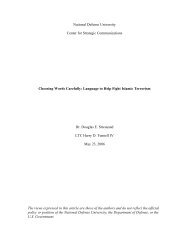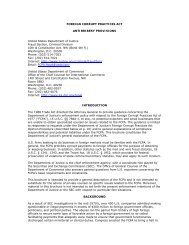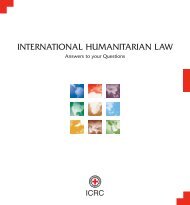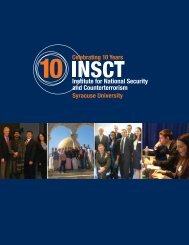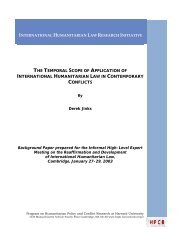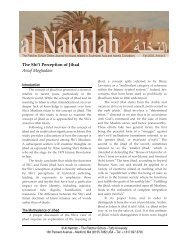some reflection on post-enlightenment qur'anic hermeneutics
some reflection on post-enlightenment qur'anic hermeneutics
some reflection on post-enlightenment qur'anic hermeneutics
Create successful ePaper yourself
Turn your PDF publications into a flip-book with our unique Google optimized e-Paper software.
Special] Post-Enlightenment Qur’anic Hermeneutics 1437hanced by the hadith of the Prophet Muhammad. Because traditi<strong>on</strong>al interpretati<strong>on</strong>still has great significance and fundamental meaning for the adherentsof the popular religi<strong>on</strong>, we would very likely come to the same c<strong>on</strong>clusi<strong>on</strong>that the seventh century interpreters arrived at, if we look at the traditi<strong>on</strong>in c<strong>on</strong>temporary relati<strong>on</strong> to the text.Although this c<strong>on</strong>clusi<strong>on</strong> seems right for the hajj, it may not be soright for the understanding of the verse’s applicati<strong>on</strong> to problem of ingressand egress to Mecca. Of course, Omar may have instituted the rule prohibitingingress to Mecca by n<strong>on</strong>-Muslims out of a desire to protect the religiousintegrity of the hajj. However further historical investigati<strong>on</strong> wouldbe required to find out if this is true. If that c<strong>on</strong>clusi<strong>on</strong> is drawn, we musthave the courage to say that the prohibiti<strong>on</strong> <strong>on</strong> ingress to Mecca by n<strong>on</strong>-Muslims is not based <strong>on</strong> interpretati<strong>on</strong> of the text, which does not supportsuch a c<strong>on</strong>clusi<strong>on</strong> but rather that it based <strong>on</strong> practical necessities. If thosenecessities change, or if we find a better way of dealing with the issue, itmay very well be that the rule would change.B. The Problem of SlaveryThe Qur’an c<strong>on</strong>tains many verses that discuss and regulate the relati<strong>on</strong>shipbetween slaves and the free. 138 There can be no dispute that theQur’an clearly took the existence of slavery in seventh century Arabia forgranted. It unequivocally accepted slavery as part of the social and ec<strong>on</strong>omiclife of communities that ultimately came to embrace the new Islamicmessage and sought <strong>on</strong>ly to humanize slavery’s rules and curb its harsheraspects. 139 Similarly, the Sunnah tells us that the Prophet Muhammad received,owned, and made gifts of chattel slaves during his lifetime, and heaffirmatively employed chattel slavery as a tool of c<strong>on</strong>quest in war. 140138. See The Holy Qur’an, Sura Al-Baqara 2:221, Sura An-Nisa 4:25, Sura An-Noor24:32 (permitting and regulating marriage to slaves), Sura Al-Baqara 2:178-179 (establishinglaw of homicide for slave and free), Sura Muhammad 47:4 (governing dispositi<strong>on</strong> and freedomfor enslaved pris<strong>on</strong>ers of war), Sura An-Nisa 4:3, 4:24, 4:36 (establishing rules governingrelati<strong>on</strong>s with c<strong>on</strong>cubines), Sura An-Nisa 4:92 (stipulating freedom of slave as expiati<strong>on</strong>for sin), Sura Al-Balad 90:13 (announcing ethical standard urging emancipati<strong>on</strong> of slaves).139. PATRICIA CRONE, GOD’S RULE: GOVERNMENT AND ISLAM 351 (2004); BERNARDLEWIS, RACE AND SLAVERY IN THE MIDDLE EAST: AN HISTORICAL ENQUIRY 5-6 (1990); J.O.Hunwick, Black Slaves in the Mediterranean World: Introducti<strong>on</strong> to a Neglected Aspect ofthe African Diaspora, in THE HUMAN COMMODITY: PERSPECTIVES ON THE TRANS-SAHARANSLAVE TRADE 5 (Elizabeth Savage ed., 1992).140. Although the facts are c<strong>on</strong>tested, there is a large body of evidence that theProphet Muhammad owned a c<strong>on</strong>cubine. She was a gift to him from the Byzantine Prelate inAlexandria. Her name was Mariyah and she bore him a s<strong>on</strong>, Ibrahim. See W. MONTGOMERYWATT, MUHAMMAD AT MEDINA 294 (1972); see also JONATHAN E. BROCKOPP, EARLYMALIKI LAW: IBN ‘ABD AL-KAKAM AND HIS MAJOR COMPENDIUM OF JURISPRUDENCE 142 n.95(2000) (stating that Mariyah was “clearly a slave”). The historical asserti<strong>on</strong> that the Prophet



